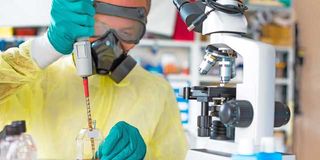Premium
Fear and panic as learners, school staff contract Covid-19

A team of experts were dispatched to two schools after learners tested positive.
What you need to know:
- In Nairobi, two non-teaching workers at Nova Pioneer School test positive
- In Nandi and Kakamega counties, health officials take two students to isolation centres
At least two cases of Covid-19 have been confirmed in schools a week after basic education institutions partially reopened, casting doubt on plans for full resumption of in-person learning.
Health officials in Nandi County are on high alert after a student at Kabote SDA Secondary School in Nandi Hills who tested positive for coronavirus was taken to an isolation centre.
There was panic also at Lelmokwo Secondary, but the county Health Executive Ruth Koech only confirmed the case at Kabote.
“A team of experts were dispatched to the two schools and tests revealed a single Covid-19 case at Kabote Secondary,” she said, adding that her department was prepared to handle Covid-19 cases in the six sub-counties in the region.
Nandi Hills Hospital Medical Superintendent Joseph Kangor told the Nation yesterday that medics had been visiting Kabote to test the learners.
“The health teams are closely monitoring schools to ensure the situation is under control,” Ms Koech said.
In the second case, a Form Four student at St Peter's Boys in Kakamega County is admitted to an isolation centre in Mumias after he tested positive for the virus that has so far claimed 842 lives.
The KCSE candidate had earlier been rushed to St Mary's Mission Hospital for treatment after he developed a fever while in school.
Two other students have been isolated at the school because they had interacted with their colleague.
Self-quarantine
"He is currently in stable condition at the isolation centre. Adequate measures have been taken to ensure that other students who interacted with him self-quarantine in a facility at the school," said Dr Collins Matemba, the county Health executive.
Public health teams visited the school to advise the management of the institution to enhance measures to contain the spread of the virus.
In Nairobi, two non-teaching staff at Nova Pioneer Schools were also confirmed to have contracted the virus, delaying reopening by a week, according to director Christopher Khaemba.
“We did contact tracing and tested others as well. It concerns us and that is why we did what did, especially for those handling the children,” he told the Nation.
He, however, ruled out testing all the learners who will open today, saying it would be too expensive.
The cases come days after it emerged that many public schools reopened when they were not fully prepared to adhere to the protocols established by the Health ministry.
Many do not have running water for hand washing, and social distancing will be a big challenge once all learners report back.
When the schools resumed in-person classes for learners in Grade 4, Standard 8 and Form 4, Education Cabinet Secretary George Magoha said authorities would monitor the situation for two weeks before recalling the rest of the learners.
The Covid-19 response taskforce that he appointed had recommended that schools fully reopen from next week in an effort to squeeze in the second term before the year ends to avoid a repetition of the academic year.
The team also suggested to pack four terms in 2021 instead of the usual three, with the regular calendar expected to resume in January 2022.
The National Parents Association Chairman Nicholas Maiyo has already indicated that they will petition the government to close schools in case learners get infected.
Containment measures
Schools were reopened after President Kenyatta relaxed the Covid-19 containment measures. There has since been a spike in infections, with Health Cabinet Secretary Mutahi Kagwe recently warning of stricter measures if the trend is not reversed.
“Counties like Kilifi that had registered remarkable containment are now back to registering high numbers of positive cases,” Kagwe said on Sunday.
“Other counties like Nakuru, Trans Nzoia, Turkana, Kisii, Kisumu and Bungoma are also on a worrying trajectory.”
Learners in public schools are mostly at risk because of poor infrastructural preparedness.
In case the rest of the learners are recalled, the schools lack the capacity to enhance guidelines on Covid-19 prevention in classrooms, dormitories, dining areas and toilets.
Adequate running water for regular hand washing remains a challenge for many schools while some learners do not also have face masks or the masks are of poor quality.
Reported by Tom Matoke, Benson Amadala and David Muchunguh





